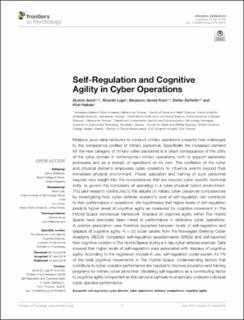Self-regulation and cognitive agility in cyber operations
Jøsok, Øyvind; Lugo, Ricardo Gregorio; Knox, Benjamin James; Sütterlin, Stefan; Helkala, Kirsi Marjaana
Peer reviewed, Journal article
Published version
Permanent lenke
https://hdl.handle.net/11250/2650369Utgivelsesdato
2019Metadata
Vis full innførselSamlinger
Sammendrag
Reliance upon data networks to conduct military operations presents new challenges to the competence profiles of military personnel. Specifically the increased demand for the new category of military cyber personnel is a direct consequence of the utility of the cyber domain in contemporary military operations, both to support leadership processes and as a domain of operations on its own. The conflation of the cyber and physical domains empowers cyber operators to influence events beyond their immediate physical environment. Proper education and training of such personnel requires new insight into the competencies that are beyond cyber specific technical skills, to govern the complexity of operating in a cyber-physical hybrid environment. This pilot research contributes to the debate on military cyber personnel competencies by investigating how cyber defense operator’s level of self-regulation can contribute to their performance in operations. We hypothesize that higher levels of self-regulation predicts higher levels of cognitive agility as measured by cognitive movement in The Hybrid Space conceptual framework. Displays of cognitive agility within The Hybrid Space have previously been linked to performance in defensive cyber operations. A positive association was therefore expected between levels of self-regulation and displays of cognitive agility. N = 23 cyber cadets from the Norwegian Defence Cyber Academy (NDCA) completed self-regulation questionnaires (SRQs) and self-reported their cognitive location in The Hybrid Space during a 4-day cyber defense exercise. Data showed that higher levels of self-regulation were associated with displays of cognitive agility. According to the regression models in use, self-regulation could explain 43.1% of the total cognitive movements in The Hybrid Space. Understanding factors that contribute to cyber operator performance are needed to improve education and training programs for military cyber personnel. Validating self-regulation as a contributing factor to cognitive agility is important as this can be a pathway to empirically underpin individual cyber operator performance.
Beskrivelse
Frontiers is fully compliant with open access mandates, by publishing its articles under the Creative Commons Attribution licence (CC-BY). Funder mandates such as those by the Wellcome Trust (UK), National Institutes of Health (USA) and the Australian Research Council (Australia) are fully compatible with publishing in Frontiers. Authors retain copyright of their work and can deposit their publication in any repository. The work can be freely shared and adapted provided that appropriate credit is given and any changes specified.

